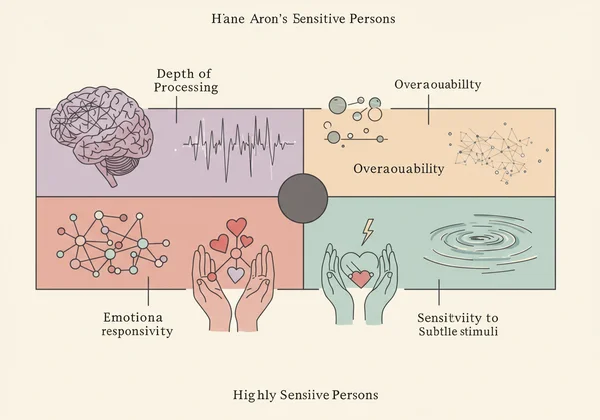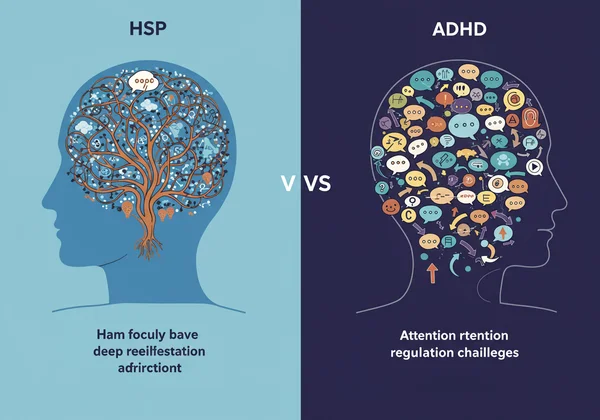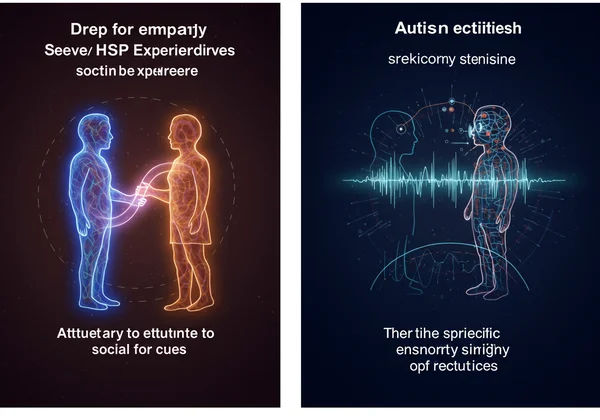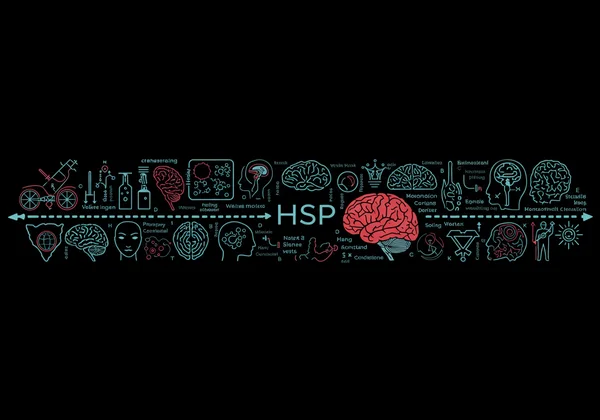HSP Test, ADHD, & Autism: Key Differences for Highly Sensitive Individuals
July 13, 2025 | By Eleanor Reed
Do you often feel overwhelmed by sensory input, or find yourself processing emotions more deeply than others? These experiences can feel confusing, especially when they seem to overlap with common conditions like ADHD or Autism Spectrum Disorder (ASD). You might even wonder: Is HSP the same as neurodivergent? This guide aims to bring you clarity, distinguishing the unique characteristics of a Highly Sensitive Person (HSP) from ADHD and Autism, empowering you to truly understand your unique sensitivities. If you're seeking to understand your unique traits, consider taking a scientifically backed HSP test on our website.
Understanding Highly Sensitive Person (HSP) Traits: Taking an HSP Test for Clarity
Before diving into comparisons, let’s establish a clear understanding of what it means to be a Highly Sensitive Person. The term "Highly Sensitive Person" was coined by psychologist Dr. Elaine N. Aron, who has conducted extensive research into this innate trait. It's estimated that 15-20% of the population shares these unique highly sensitive traits.
Is HSP a Disorder? Understanding the Highly Sensitive Trait
Understand this clearly: being an HSP is a normal, healthy biological trait, not a disorder or a diagnosis. It describes a particular temperament characterized by a deeper processing of physical, emotional, or social stimuli. This means your nervous system is wired to pick up on subtleties that others might miss, and you process information more thoroughly. This inherent sensory processing sensitivity can lead to both advantages and challenges in daily life.
Elaine Aron's DOES Model: Understanding Core HSP Traits
Dr. Aron developed the DOES model HSP to encapsulate the four core aspects of high sensitivity:
- D for Depth of Processing: HSPs tend to process information deeply. They reflect on experiences, connect new information to existing knowledge, and think profoundly about issues.
- O for Overarousability: Because of their deep processing, HSPs can become easily overstimulated by external factors like loud noises, bright lights, or crowds, leading to feeling overwhelmed.
- E for Emotional Responsivity and Empathy: HSPs feel emotions deeply and have a strong capacity for empathy. They can often sense the feelings of others and are deeply moved by art, nature, or intense experiences.
- S for Sensitivity to Subtle Stimuli: They notice subtleties in their environment that others might not, from a slight change in someone's tone of voice to a small detail in a room.
These traits together form the foundation of the HSP personality test, guiding individuals toward self-recognition.

HSP vs. ADHD: Untangling Overlaps and Distinctions
Many people confuse high sensitivity with Attention-Deficit/Hyperactivity Disorder (ADHD) because some symptoms can appear similar on the surface. However, the underlying mechanisms and core experiences are quite different. Understanding the nuances is key to avoiding misdiagnosis.
Shared Sensitivities vs. Core ADHD Symptoms
Both HSPs and individuals with ADHD can experience sensory overload. For an HSP, this might manifest as being overwhelmed by a noisy environment due to deep processing of all auditory stimuli. For someone with ADHD, sensory overload might be due to difficulties filtering irrelevant sensory input, leading to distraction and an inability to focus.
The core ADHD symptoms revolve around challenges with executive functions: attention regulation, impulsivity, and hyperactivity. While an HSP might struggle to focus in a chaotic environment because they're absorbing too much, a person with ADHD might struggle to focus regardless of the environment due to an inherent difficulty with sustained attention.
Processing Styles: Deep Reflection vs. Attention Regulation
The real difference comes down to processing styles. HSPs are characterized by deep reflection. They take time to consider all angles, often leading to slower decision-making, not because they can't focus, but because they are processing thoroughly. They might appear hesitant or quiet as they internally weigh options.
In contrast, ADHD involves challenges with attention regulation. Individuals with ADHD might struggle to maintain focus on tasks they find unstimulating, leading to easily shifting attention, forgetfulness, and difficulty organizing tasks. While an HSP might be "stuck" due to overthinking, an ADHD individual might be "stuck" due to difficulty initiating or sustaining mental effort. Recognizing these ADHD vs HSP differences is crucial for accurate self-understanding.

HSP vs. Autism: Clarifying Social & Sensory Differences
Another common area of confusion is differentiating between HSP and Autism Spectrum Disorder (ASD). While both can involve sensory sensitivities and specific social experiences, the core nature of these experiences differs.
Empathy and Social Nuance in HSPs vs. ASD
One significant distinction lies in social interaction and empathy. HSPs typically possess a high capacity for empathy in HSP, often feeling others' emotions intensely and being highly attuned to social cues and social nuance. They deeply value meaningful connections and may feel overwhelmed by superficial interactions or conflict. Their social challenges often stem from overstimulation in social settings or feeling overwhelmed by others' emotions.
Conversely, individuals with ASD often experience difficulties with social communication and interaction, which can include challenges with interpreting non-verbal cues, understanding social reciprocity, and displaying typical Autism social traits. While they may possess empathy, its expression and experience can differ from neurotypical individuals or HSPs. Their social experiences may involve different patterns of connection or different forms of communication.
Sensory Processing: How Similar, How Different?
Both HSPs and individuals with ASD can have heightened sensory processing sensitivity. An HSP might find certain textures uncomfortable or be easily startled by loud noises because their nervous system processes these inputs deeply. This often leads to a preference for calmer environments and a strong reaction to intense stimuli.
For individuals with ASD, autism sensory issues can range from hypersensitivity (being overwhelmed by certain sensations) to hyposensitivity (under-reacting to stimuli). These sensory experiences are often integrated into broader patterns of repetitive behaviors or restricted interests, serving as a distinct part of the neurodevelopmental profile. While the outcome (discomfort from sensory input) might seem similar, the underlying neurological pathways and overall impact on functioning can be different.

Is HSP Neurodivergent? Addressing the Broader Context
The term "neurodivergent" refers to individuals whose brains are wired differently from what is considered typical (neurotypical). This includes conditions like ADHD, Autism, dyslexia, and Tourette's Syndrome. So, where does HSP fit in?
HSP as a Temperament vs. Neurodevelopmental Conditions
HSP is widely considered a normal, innate HSP trait or temperament, not a neurodevelopmental condition or disorder. It's a fundamental difference in how one processes information, present from birth. While it does involve a distinct nervous system, it’s not classified alongside conditions like ADHD or autism, which are clinical diagnoses associated with specific developmental differences.
The neurodiversity spectrum is broad, and discussions continue about whether high sensitivity could be considered a form of neurodivergence. However, in the context of established psychology, HSP is typically viewed as a personality trait found in both neurotypical and neurodivergent populations. A person could be both an HSP and have ADHD, for example.

Why Accurate Understanding Prevents Misdiagnosis
Accurate understanding of these distinctions is paramount to prevent misdiagnosis. Mistaking HSP for ADHD or Autism can lead to inappropriate interventions, frustration, and a lack of self-acceptance. Knowing your true highly sensitive traits allows you to leverage your strengths, manage challenges effectively, and seek the right kind of support if needed. It empowers you to embrace your authentic self.
This clarity helps self-explorers, parents, and professionals make informed decisions about understanding unique behavioral patterns. Ready to explore if these insights resonate with your own experience? Our scientifically backed HSP test is designed to help you discover your unique sensitivities and begin your journey towards deeper self-understanding.
Frequently Asked Questions About HSP and Neurodivergence
Is HSP a symptom of ADHD?
No, HSP is not a symptom of ADHD. HSP is an innate personality trait characterized by deep processing and sensitivity to stimuli, while ADHD is a neurodevelopmental condition affecting attention, impulsivity, and hyperactivity. While both can experience sensory overload, the underlying reasons and core characteristics are distinct.
Is HSP considered autism?
No, HSP is not considered autism. HSP is a temperament trait defined by deep processing and emotional responsiveness. Autism Spectrum Disorder (ASD) is a neurodevelopmental condition primarily characterized by challenges in social communication, interaction, and restricted or repetitive patterns of behavior. While both may involve sensory sensitivities, their social experiences and overall profiles differ significantly.
What could be mistaken for HSP?
What could be mistaken for HSP? Many traits can appear similar to high sensitivity, including shyness, introversion, social anxiety, or even certain aspects of ADHD or autism. However, HSP is distinct as an innate trait of deeper processing, emotional responsiveness, and sensitivity to subtleties. Shyness is a behavioral tendency, introversion is a preference for lower stimulation, and anxiety is a state of mind, whereas HSP is a biological predisposition.
Is HSP the same as neurodivergent?
HSP is generally considered an innate HSP trait or temperament, not a neurodevelopmental condition like ADHD or autism. Therefore, it is typically not classified as neurodivergent in the same way these conditions are. However, a person can be both an HSP and neurodivergent, as these are not mutually exclusive. The term "neurodivergent" describes a brain that functions differently from what is considered typical.
How can I confirm if I am a highly sensitive person?
To confirm if I am a highly sensitive person, the most reliable initial step is to take a scientifically-backed HSP test. Our site offers a comprehensive online official hsp test based on Dr. Elaine N. Aron’s research, providing immediate insights into your sensitivity levels. This can serve as an excellent starting point for self-discovery and understanding your unique traits.